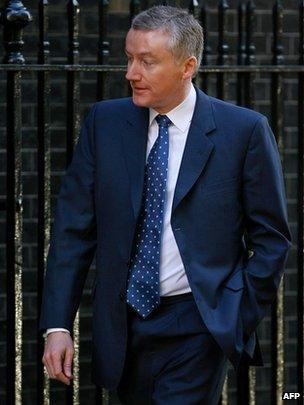Do business leaders deserve their gongs?
- Published
- comments

Sir Fred Goodwin was in the charge of RBS in the run-up to its near-collapse
Business leaders do like their gongs.
Many is the time, I have been rung up by a pal of an untitled business leader to be asked if I have any idea why he (it's always a he) hasn't been knighted yet - and enquiring what can be done about it (the supposition is that I know how the wheels and cogs of these things operate, though I am not sure I really do).
So if I were the boss of a big PLC, I might be slightly anxious about all the fuss over whether Sir Fred Goodwin should be stripped of his knighthood, because there is a risk that it will focus attention on why those who run our biggest businesses are routinely honoured.
The point is that if you become chairman or chief executive of one of the UK's biggest businesses, and you don't make a conspicuous mess of it in the first three years or so (Sir Fred didn't), there is a very high probability that you will be knighted or damed (is that a word? You know what I mean).
In a worst case, you will probably be made a CBE.
And sometimes, for those with the best political connections, there's a peerage to be bagged (years ago, one business leader was ennobled allegedly because Tony Blair got his wires crossed and thought he was someone else - which may be apocryphal, but perhaps says something about the slightly casual way in which these decisions are made).
So here's the thing: all the media and political pressure to strip Sir Fred Goodwin of his knighthood rather raises the question of why he was knighted in the first place - and more broadly why those who run substantial companies routinely receive public honours.
The important and troubling background for business leaders is this: the government has joined the ranks of those who believe that many business leaders are paid more than they deserve. And on Tuesday, the business secretary, Vince Cable, will announce new policies to curb alleged excesses in executive remuneration.
Business leaders of course argue that they should receive the going rate - which happens to be a very high rate - for the challenging job of running a huge business. But if they are getting magnificent financial rewards for what they do, many might well ask why they deserve a gong on top.
If someone has already received more than his or her just financial deserts for what they do in life, the knighthood might then look like an institutionalised form of having your cake and eating it: lovely for the recipient, but perhaps of limited social utility.
Now if these business leaders were making some great personal financial sacrifice when creating employment, generating tax revenues for the benefit of the nation, boosting the values of our pensions and so on, then presumably they would deserve to be drenched in honours from all parts of this great nation.
But the widespread view - including, from what I can gather, that of the prime minister - is that most of them don't make any great financial sacrifice.
Or as an economist might put it, if there are positive externalities generated by a business (good things for the wider economy for which the company doesn't receive direct financial payment), the chief executive is already being amply rewarded for them by a surplus element in his or her pay.
In yet another Daily Mail splash arguing that Sir Fred should be de-gonged, the Labour leader, Ed Miliband, says: "It's wrong to have given him the knighthood and it's right that it should be revoked, external". The prime minister yesterday said that it was a good thing that the so-called Forfeiture Committee would look at whether Sir Fred should revert to becoming plain Mr Goodwin.
To be clear, it is perfectly natural for questions to be asked about whether a chief executive should retain a badge indicating that he is revered nationally in some kind of way, after his reckless expansion of Royal Bank of Scotland led to the biggest taxpayer bailout in British corporate history and contributed to the darkest deepest recession since the 1930s.
But if the Forfeiture Committee were to look in any thorough way at why Sir Fred received his gong in the first place, it might draw wider conclusions about how these honours are awarded to business leaders in general that might suggest they should be handed out rather more sparingly.
Which suggests there may be a useful public policy lever for the prime minister to pull. If he wants to defuse the whole row over executive pay, he could present business leaders with a stark choice: gongs or bonuses? I wonder which they would choose.
UPDATE 11:35
Manifest, the shareholder proxy voting service, has run the numbers on gongs in FTSE100 boardrooms. Apparently there are 63 knights, 19 lords, seven baronesses and only three dames. So just under one per FTSE100 business on average (excluding CBEs, OBEs, etc).